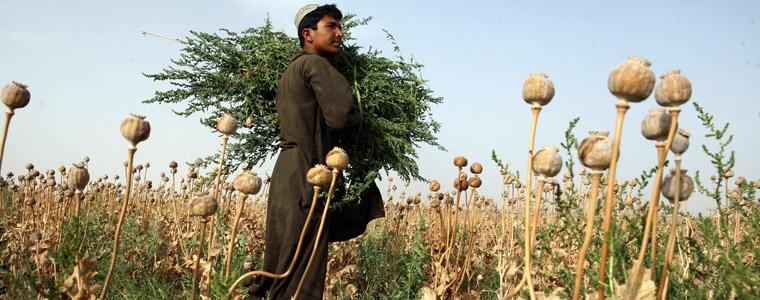Top Afghan Officials Appeal for Sustained Help Against Opium
Top Afghan ministers and the governors of Kandahar, Helmand and Farah provinces appealed for international support of projects to curb the country’s opium poppy trade over the long haul, amid the risk that cultivation will rise in the short term as most U.S.-led military forces withdraw and foreign aid declines.

The officials spoke during an event at the U.S. Institute of Peace on June 12 that was billed “An Uphill Battle: Counter-Narcotics Issues and Policies During Afghanistan’s Transition.” Despite years of Afghan and international efforts to eradicate the scourge of opiate production that fuels the insurgency and government corruption, Afghanistan remains the largest global producer of illicit opiates.
Afghan Minister of Counter Narcotics Zarar Ahmad Moqbel Osmani called it “one of the greatest challenges to my country, to the region and to numerous other countries.”
“The security transition process from foreign forces to Afghan forces in Afghanistan leaves undefined and unknown the role of counter-narcotics cooperation, which could endanger our twelve years of achievements,” Osmani told the audience, which included U.S. government officials and congressional staff. “Therefore, we call on the international community to take practical measures to enable us to combat this evil phenomenon post 2014.”
The Taliban and terrorist networks earn $155 million to $400 million annually from narcotics, and Afghanistan counts more than 1 million people as addicts, Osmani said.
The latest risk assessment, issued in April by the United Nations Office on Drugs and Crime with Osmani’s ministry, concluded that poppy cultivation probably would increase this year in most of the biggest-producing provinces, including Kandahar, Helmand and Farah. The three provinces account for more than 80 percent of opium poppy cultivation in Afghanistan, said William Byrd, an Afghanistan senior expert at USIP.
In an April Peace Brief published by USIP, Byrd recommended a long-term, sustained policy on counter-narcotics for Afghanistan that focuses on rural development as “essential for enabling farmers to move away from dependence on opium poppy cultivation over the long term.”
He cautioned against over-reaction by the international community in the event poppy cultivation and drug production increases in the short term. Extreme steps such as chemical spraying could backfire, prompting farmers to shift and expand cultivation, contributing to conspiracy theories about the health effects of the chemicals, and turning people against the Afghan government while providing a propaganda opening for the Taliban.
Osmani and the governors of Helmand and Kandahar touted the positive effects of U.S.-backed programs that, while controversial in some aspects, have provided alternatives for farmers. Arrests of large-scale landlords and drug smugglers also have had an effect, they said.
Kandahar Governor Tooryalai Wesa said his province plans to inaugurate a comprehensive counter-narcotics program in September that will include encouraging alternative crops, organizing public awareness campaigns, tackling drug production and strengthening law enforcement.
Osmani said Afghanistan aims to accelerate the capture and prosecution of well-known smugglers. Afghan authorities have arrested seven of the top 10 traffickers targeted, including figures who had political and financial power in Afghanistan, Osmani said. “This is a major breakthrough of the Afghan government,” he said.
Baz Mohammad Ahmadi, Afghanistan’s deputy minister of the interior for counter-narcotics, added that there hasn’t been a single case of a major trafficker who has been arrested being released as a political favor or under pressure.
Still, obstacles to progress include continuing global demand and what Osmani called a “low level” of seizures, arrests and identification of drug-funding patterns by regional players such as Russia, Iran and Pakistan.
“The support of the regional and international community is a key factor,” he said.
USIP President Jim Marshall told the audience there is “no realistic prospect” that Afghanistan’s role as the largest global producer of illicit opiates will change anytime soon.
The “international troop presence will be greatly reduced,” Marshall said. “Financial resources for counter-narcotics efforts, including for alternative livelihoods, will diminish, and the 2014/2015 election cycle will probably make it more difficult at least in the short run to take strong actions against drugs.”
Helmand Province Governor Mohammad Naeem Baloch said most Afghan farmers are prepared to give up poppy cultivation if they have another way to meet the basic needs of their families. In Farah Province, on the border with Iran, 70 percent of farmers growing opium poppies do so to feed their families, Governor Mohammad Akram Khpalwak said.
“We’re expecting a lot, without considering our capacity, what capacity we have,” Wesa said. “There has to be commitment from the region, from the international (community) to work together and eradicate this crop forever.”



